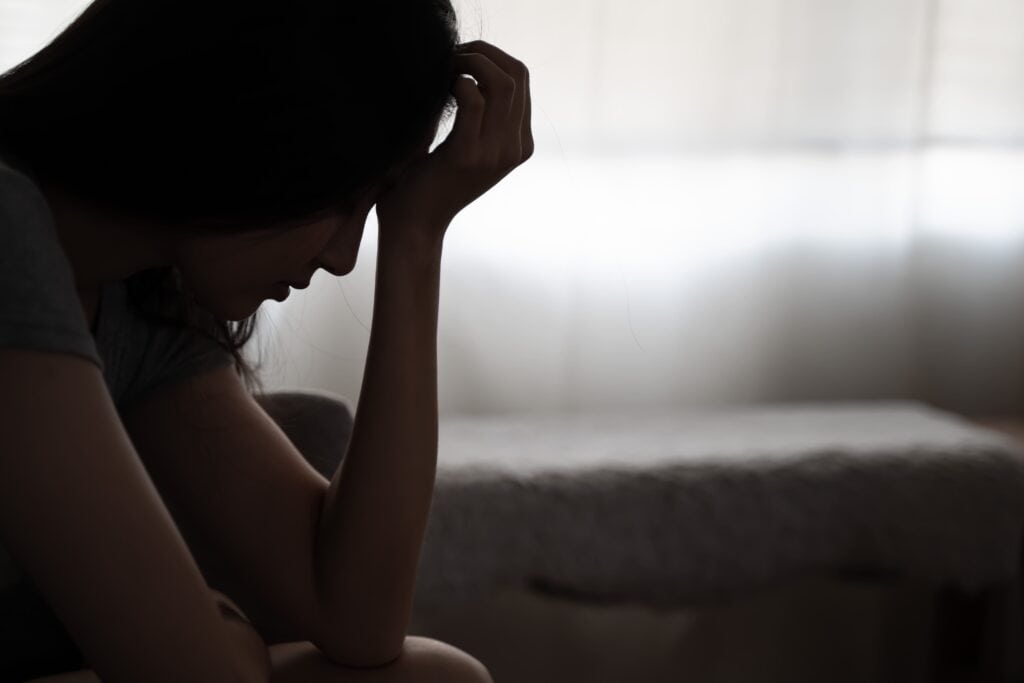Do I Need Rehab?
- Home
- Do I Need Rehab?
When someone is struggling with the devastating effects of a substance use disorder, it’s hard to know where to turn. They may wonder, “Do I need rehab?” Louisville Addiction Center is here to help. Our addiction specialists support and guide individuals seeking resources and treatment options.
We provide safe and effective drug and alcohol rehab in Louisville, KY with comprehensive services for those seeking healing and recovery from addiction. In addition, our experienced team offers compassionate care and personalized treatment plans based on each individual’s unique needs. Moreover, we strive to create a peaceful environment that encourages healing, growth, and lasting sobriety.
Recognizing the Warning Signs of Addiction
The 2021 National Survey of Drug Use and Health (NSDUH) reported that 46.3 million Americans aged 12 or older met the DSM-5 criteria for having a substance use disorder in the past year. Substance use disorder (SUD) is a complex disease affecting millions of people. Also, SUDs affect people from all walks of life. Understanding the warning signs of addiction is important for early intervention and effective treatment. Therefore, these are some signs you need rehab:
Changes in Behavior
One of the first warning signs of addiction is a shift in behavior. Individuals in active addiction may have mood swings, irritability, agitation, or become secretive. They may distance themselves from family and friends, lose interest in activities they once enjoyed, or neglect responsibilities at work, school, or home. Uncharacteristic changes in behavior should be concerning.
Physical and Psychological Dependence
Addiction often leads to physical and psychological dependence on a substance and the activity itself. If someone needs to increase the amount of the substance to achieve the same effect or start having withdrawal symptoms when they don’t have the substance may indicate addiction. Psychological dependence shows itself as an overwhelming craving and compulsion to engage in addictive behaviors.
Increased Tolerance
Tolerance to drugs or alcohol is an obvious warning sign of addiction. Over time, the body becomes used to the substance and its effects. This leads to the need for higher doses or increased frequency to have the same reaction. Individuals start to use larger amounts of the substance, engage in risky behaviors, or spend more extended periods using or seeking the substance. This escalation is a dangerous cycle that leads to severe consequences.
Neglected Responsibilities and Relationships
Addiction takes a toll on all aspects of a person’s life. Someone struggling with addiction often misses miss work, experiences financial difficulties, or neglects family and other responsibilities. They choose their addiction over their obligations. As a result, they damage relationships and their support system. Neglected obligations and strained relationships are powerful indicators of addiction.
Declining Physical and Emotional Health
Addiction has severe consequences on an individual’s physical and emotional well-being. Friends and family may notice frequent illness and health problems, changes in physical appearance, unexplained weight loss or gain, insomnia, and neglecting personal hygiene. Additionally, addiction often comes with emotional disturbances, mood swings, anxiety, depression, and a loss of interest in previously enjoyed activities.
Understanding the warning signs of addiction is paramount for early intervention and effective treatment. These signs are crucial indicators that may signify the need for professional intervention and rehabilitation, emphasizing the importance of recognizing when signs you need rehab are present. If you or someone you know resonates with these signs, don’t hesitate to reach out for support and guidance on the journey to recovery.

Recognizing When to Go to Rehab: Key Indicators and Considerations
Recognizing when to seek rehabilitation for addiction is crucial for effective intervention and recovery. Here are key indicators that it may be time to consider entering a rehab program:
Escalation of Substance Use: If you notice that you need to consume larger amounts of the substance or engage in addictive behaviors more frequently to achieve the desired effect, it may indicate a growing tolerance and dependency, signaling a need for professional assistance.
Unsuccessful Attempts to Quit: If you’ve tried to quit or cut back on your own but find yourself unable to maintain sobriety, despite your efforts, it may be time to seek the structured support and resources available in a rehab setting to address underlying issues and develop coping strategies.
Interference with Daily Life: When addiction starts to interfere significantly with your daily life, responsibilities, and relationships, resulting in missed work, financial difficulties, or strained connections with loved ones, seeking rehab can provide the necessary environment for recovery and rebuilding.
Presence of Withdrawal Symptoms: Experiencing physical or psychological withdrawal symptoms when attempting to stop or cut back on substance use is a clear indication of dependency and may require professional medical supervision and support available in a rehab facility.
Recognition of the Severity of Addiction: Acknowledging the severity of your addiction and the negative impact it’s having on various aspects of your life is a critical step towards seeking help. If you find yourself recognizing the need for a more structured and intensive treatment approach, rehab can offer the necessary support and guidance for long-term recovery.
Ultimately, the decision on when to go to rehab should be guided by a recognition of the impact addiction has on your life and a commitment to seeking the help and support needed to overcome it.
Do I Need Rehab or Can I Stop on My Own?
Recognizing when your substance use has gotten out of control and the need for assistance is the first step toward sobriety. If you find it difficult or impossible to control your drug or alcohol use, and you have tried repeatedly to cut back or quit without success, then you are not likely going to be able to stop on your own.
Addiction can lead to many physical and mental health problems. If you are experiencing physical symptoms or noticing changes in your mental health, you should reach out for help as soon as possible. Physical or psychological withdrawal symptoms are signs of dependence when attempting to stop or reduce substance use. Medical detox can provide support and guidance during this transition.
Do I need rehab if my family and friends are concerned about my substance use? Typically, when loved ones express concerns, it is time to seek professional help. It’s important to listen to their perspective. They may see the negative effects of addiction more clearly and can provide valuable support throughout the recovery process. Remember, asking for help is a courageous and positive step toward recovery. Furthermore, you are not alone.
There are many addiction and mental health resources available, such as helplines, support groups, therapists, and treatment centers. These resources provide guidance and support to help you overcome addiction and regain control of your life. At Louisville Addiction Center we understand how daunting it can be to take that first step. Our confidential drug and alcohol rehab in Louisville, KY provides the necessary tools and strategies to overcome addiction.
Dangers of Detox at Home
Detoxification is the process of eliminating toxic substances from the body. It is always recommended to consult with an addiction specialist who can guide the safest and most effective approach to detox. While many people try at-home detox methods, certain individuals should not attempt detox at home without medical support and supervision.
For example, the American Society of Addiction Medicine (ASAM) advises people against trying alcohol detox at home due to the risk of complications from withdrawal. Other examples include the following:
- Severe substance dependence: Individuals with severe alcohol or drug dependence should not attempt to detox at home. Abruptly stopping the use of certain substances can lead to severe and dangerous withdrawal symptoms that need medical intervention to be managed safely.
- Co-occurring medical conditions: People with co-occurring medical conditions, such as heart, liver, or kidney problems, or any other serious health condition, should not attempt detox at home without medical guidance. These conditions may require special medical care during the detox process.
- Mental health issues: Individuals with underlying mental health disorders, such as depression, anxiety, or bipolar disorder, should be cautious about detoxing at home. Detoxification can worsen or trigger severe mental health symptoms. Thus, making professional support crucial to ensure safety and appropriate withdrawal management.
- Previous failed attempts: Anyone who has attempted detox at home previously and had severe withdrawal symptoms, complications, or relapse should avoid trying it again without professional support. Such individuals may require more comprehensive treatment or medical intervention to ensure a successful and safe detox.
- Lack of support system: Detoxification can be physically and emotionally challenging. Therefore, without a dependable support system at home, such as family or friends who can provide help and encouragement, detox may be unsuccessful. In this case, seeking professional help in an appropriate treatment facility is recommended.

What Type of Rehab Do I Need?
After asking themselves “Do I need rehab?”, people then may wonder what type of rehab they need. There are several factors to consider when looking for the type of treatment program they need. Everyone has their own unique story. There is no one-size-fits-all addiction treatment program.
Accordingly, it depends on an individual’s specific needs, the severity of the addiction, available resources, preferences, and recovery goals. Here are some common types of rehab programs:
- Inpatient/Residential: Inpatient programs provide a highly structured level of care. Individuals stay at a facility for some time and receive extensive treatment with 24/7 supervision. This type of program is recommended for individuals with severe addictions or those who require a high level of supervision and support.
- Detox Programs: Some addiction treatment facilities only provide detox services. After completing detox, individuals continue treatment in other programs depending on their specific needs. Detox is only the first step on the path to recovery.
- Partial Hospitalization Program (PHP): During PHP at our rehab in Louisville, KY clients attend sessions around five to six hours a day, and five days a week. This intensive treatment program is appropriate for those with severe addiction or dual diagnosis but they do not need to live at a facility full-time.
- Intensive Outpatient Programs (IOP): IOPs provide more intensive treatment and frequency than regular outpatient programs. Weekly sessions include individual therapy, group therapy, and educational programs. IOPs are best for clients who require more structure and support than traditional outpatient programs.
- Outpatient Programs: Outpatient programs allow clients to attend treatment sessions during the day or evening. It offers flexibility that allows clients to maintain their work, school, or family responsibilities. Outpatient programs vary in intensity, ranging from a few hours per week to several sessions per day.
How to Ask for Help with Addiction?
Taking the first step towards recovery from addiction can be daunting, but it’s an essential decision for reclaiming your life. If you’re unsure how to ask for help, consider the following steps:
Reach out to loved ones: Start by confiding in a trusted friend, family member, or support system about your struggles with addiction. Sharing your experience with someone you trust can provide emotional support and encouragement to seek professional help.
Research treatment options: Take time to research different treatment options. Including rehab facilities like Louisville Addiction Center. Educating yourself about the available resources and approaches to addiction treatment empowers you to make informed decisions about your recovery.
Seek professional guidance: Reach out to addiction specialists, therapists, or healthcare professionals for guidance and support. These professionals can assess your individual needs, provide information about available treatment programs, and offer personalized recommendations based on your specific circumstances.
Consider support groups: Joining a support group can provide a sense of community and understanding from individuals who have experienced similar challenges with addiction. These groups offer peer support, encouragement, and valuable insights into navigating the recovery process.
Be honest and open: When asking for help, be honest and open about your struggles with addiction. Admitting that you need assistance and acknowledging the impact addiction has had on your life is a courageous first step toward healing.
At Louisville Addiction Center, we recognize the courage it takes how to ask for help with addiction. Our comprehensive approach to treatment addresses both substance use disorders and underlying mental health concerns.
By offering personalized treatment plans and a range of therapeutic services, we empower individuals to start on a journey of healing and long-term sobriety. If you’re ready to take the next step towards recovery, we’re here to support you every step of the way.
Choosing Our Premier Rehab in Louisville, KY
At Louisville Addiction Center, we understand how difficult it can be to seek help for substance use and mental health disorders. Many people seeking help for their addiction aren’t aware they may be self-medicating as a result of mental health symptoms. Additionally, they don’t realize the symptoms of dual diagnosis are similar to both mental disorders and addiction.
For example, someone abusing alcohol may also have untreated depression, anxiety, or a mood disorder. That is why we recommend seeking help at our drug rehab in Louisville, KY. We believe that getting to the root cause of substance abuse leads to the most successful treatment outcomes.
Finally, our experienced team of professionals guides individuals in finding the appropriate programs and therapies to meet their needs. We create personalized treatment plans that address the question “Do I need rehab?” and detail each client’s pathway to healing and long-term sobriety. Individual treatment plans may include the following services:
- Dual diagnosis treatment
- Individual counseling
- Group therapy
- Cognitive behavioral therapy (CBT)
- Dialectical behavioral therapy (DBT)
- Medication-Assisted Treatment (MAT)
- Trauma therapy
- Holistic therapy
- Family therapy
- 12-step program
- Life skills

FAQ
Do I need rehab if I’m unsure about my substance use?
If you’re questioning whether you need rehab, it’s essential to consider the warning signs of addiction. Changes in behavior, increased tolerance, neglected responsibilities, declining health, and unsuccessful attempts to cut back or quit are indicators that rehab may be necessary.
Can I stop on my own?
If you find it challenging to control your drug or alcohol use and have repeatedly failed to quit, seeking professional help is crucial. Addiction often leads to physical and mental health problems, and attempting to stop without assistance may result in withdrawal symptoms or relapse.
What are the dangers of detoxing at home?
Detoxing at home can be risky, especially for individuals with severe substance dependence, co-occurring medical conditions, mental health issues, previous failed attempts, or lack of a support system. Professional guidance and supervision are recommended to ensure a safe and effective detox process.
Do I need rehab for prescription pill addiction?
Whether or not you need rehab for prescription pill addiction depends on various factors, including the severity of your addiction, your overall health, and your circumstances. Prescription pill addiction can be challenging to overcome on your own, especially if you have developed a dependence or are experiencing withdrawal symptoms when trying to stop using the medication.
What type of rehab do I need?
The type of rehab program you need depends on various factors, including the severity of your addiction, available resources, preferences, and recovery goals. Options include inpatient/residential programs, detox programs, partial hospitalization programs (PHP), intensive outpatient programs (IOP), and outpatient programs.
Why choose Louisville Addiction Center for rehab?
Louisville Addiction Center offers comprehensive addiction treatment services customized to individual needs. Our experienced team provides personalized treatment plans, including dual diagnosis treatment, counseling, medication-assisted treatment, trauma therapy, and more, to support healing and long-term sobriety.
Break the Chains of Addiction With Our Rehab in Louisville, KY
At Louisville Addiction Center, we understand the uncertainty when deciding to seek help for substance use or mental health disorders. We believe that everyone deserves access to quality care and compassionate support on the path to healing. If you or someone you love is struggling with addiction or mental health, don’t wait any longer—get help today.
Our experienced team of professionals is here for you every step of the way as you navigate through this journey toward recovery. With our comprehensive and personalized treatment plans to address individual needs, we are committed to providing effective solutions for individuals looking for rehab in Louisville, KY.
Contact us today to start taking back control of your life and get the fresh start you deserve.
What We Treat
Contact Us
Addiction and co-occurring disorders don’t have to control your life. Louisville Addiction Center is waiting with open arms to give you the tools necessary for lasting change. Reach out to us today to learn more.
Take The Next Step
-
Phone
502-586-4554 -
Address
827 E Market Street Louisville KY 40206
Copyright ©2023 All rights reserved by Louisville Addiction Center

